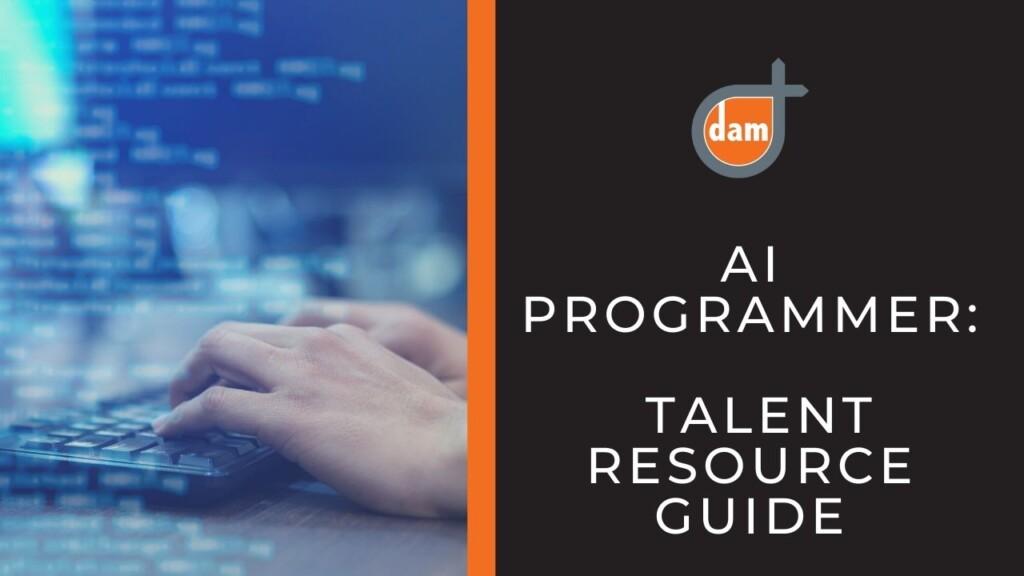AI Programmer: Talent Resource Guide
Job Title
AI Programmer
Job Overview
AI, or “artificial intelligence” programmers, have a crucial role in gameplay programming by coding NPC behaviors and interactions and giving the gameplay the proper look and feel for the gamer. AI Programming is a highly specialized area of game development that enhances the gameplay experience on a subliminal level. AI programmers are said to give a game its “brain” by creating algorithms, or a set of instructions, that dictate the behavior of the game’s characters and elements based on each player’s actions. AI programming jobs in games require algorithms to establish decision trees and neural networks within the game that create artificial nerve systems and elements. These include pathfinding, movement, and camera control that create a system of actions and reactions based on the player’s unique set of decisions. An AI programmer responsibilities may include:
- Assisting animators and programmers.
- Collaborating with animators, game designers, and developers.
- Creating custom code and AI tools.
- Designing a framework for non-playable characters’ artificial emotions.
- Developing AI elements to enhance games.
- Developing prototypes.
- Enhancing the gameplay experience.
- Establishing patterns and parameters for the game rules.
- Working on budget.
- Working with game testers to identify and fix bugs.
Required skills include:
- Advanced problem-solving and logical reasoning.
- Computer science, engineering, or game development.
- Excellent communication ability.
- Experience in writing algorithms.
- Knowledge of automation scripts.
- Intuition for and specialized knowledge of artificial intelligence parameters.
- Knowledge of neural networks and deep learning.
- Possess high-level creative, problem-solving, and critical-thinking skills.
- Strong mathematical backgrounds.
AI programming recruiters expect candidates to have experience with at least of a few of the following tools, software and concepts – and specifically for games, the first two are more or less mandatory:
- Python
- C++
- Java
- JavaScript
- Scala
- R
- Lisp
- Prolog
- Haskell
- Julia
- AIML
- Unity3D
- Unreal Engine 4
- Machine Learning
Interview Tips
The job market for onsite and remote video game jobs is extremely competitive, for both job seekers and employers. New job applicants entering the field must perform well during an interview and find ways to get a competitive advantage. Here are eight crucial tips from some of the top recruiting firms for gamers:
1) Be Punctual
Plan to arrive at least 10 minutes before the interview so you will have time to unwind mentally. This will also show that you are reliable and responsible, both crucial attributes in the video gaming industry.
2) Come Prepared With Past Work
The video game industry needs to see past work and how it has helped shape you for this possible future role. As an AI programmer, showcase past projects you have worked on and how your role helped lead to its success. If you are applying for a Lead AI Programmer position, make sure to hit specific touchpoints on how your leadership contributions helped the game’s success.
3) Research the Company
Video game recruitment companies will always encourage their candidates to familiarize themselves with the studio with which they’re interviewing. Be sure to do some thorough research on the company including reading press releases, game reviews, gameplay footage, executive bios, etc. It’ll empower you with a better sense of the studio’s work and overall vision in addition to providing great fodder for insightful questions at the end.
4) Know the Company’s Games
Because you want to stand out from the crowd, be ready to demonstrate a passion for the types of games the company produces. Play as many of their games as possible before the interview or watch gameplay footage online to familiarize yourself with it. And if released, you’ll definitely want to play the game you’ll be working on if hired — if unannounced, then the last game the studio released.
5) Expect a Test
Programming jobs often require tests, and the recruiter will usually tell you ahead of time if a test will be given at the interview. However, just because the recruiter does not mention a test does not necessarily mean there won’t be one. Performing some online research may help you figure out what to expect.
6) Study
Expect the interviewer to ask you questions that require some preparation to answer correctly. Examples include:
- “AI technologies are constantly advancing. How do you plan to keep up with new AI applications?”
- “How have your past programming roles prepared you for this position?”
- “Can you describe your specific contributions or areas you took ownership of that significantly advanced the AI in your last game?”
7) Sell Yourself
The point of any interview is to get to know the applicant and assess their qualifications. When asked a question, always try to connect with the interviewer when explaining your education, accomplishments, and relevant experience.
8) Follow Up
Send an email within 24 hours after the interview thanking the recruiter and interviewer for their time. This is a simple thing that will help you stand out from the crowd, as most applicants do not make an effort to follow up.
Portfolio Tips
Hiring managers and video game recruiters always like to see a portfolio, even from software engineers. If you are serious about the job, come prepared with a portfolio that showcases your abilities. While sharing the actual code you’ve written is always the best, it’s not uncommon that all or most of it is confidential and under NDA. Videos of gameplay footage with descriptions of your specific contributions can be very effective as well. Follow these six tips to create a comprehensive portfolio:
1) Spotlight Specialized Skills
AI covers a variety of disciplines that include computer vision, deep learning, distributed computing, knowledge management, machine learning, natural language processing, and reasoning, to name a few. However, portfolios that show you have all the AI skills can dissuade some employers looking for specific abilities. It’s okay to show you can wear multiple hats, but focus on the things you do best.
2) Showcase Your Best Projects
Select a sampling of five projects that showcase the depth of your specialized skills and experience and two or three more generic projects. Each project in your portfolio should include a snapshot of the following:
- Data set used for the project.
- Link to the code with an explanation of how to run and test it (if not under NDA)
- Project name, description, category, and overall objective.
- What tools were used.
- Feel free to share any code that you’re proud of that was written for side/personal projects
3) Document All Projects
Documenting each project you have done helps reinforce the project in your mind and makes it easier to share with prospective employers. Carefully document all of your recent games and the key contributions you made and any obstacles you may have overcome. Don’t just document the success stories, but also failed attempts, why the approach didn’t work, what you learned and how you corrected it.
4) Education
Include all of your educational experience and knowledge you have gained. This includes formal training, books you have read, papers you have written, conferences you have attended/paneled, and relevant academic projects you worked on.
5) Recommendations
Recommendations from past employers and clients go a long way in helping convince an interviewer you are the right candidate for the job. An online profile, such as LinkedIn, is an excellent way to present your experience along with testimonies. Mentioning AI experts and leaders whose work you admire will show you to keep yourself current and actively pursue a career in the AI field.
6) Three Mistakes to Avoid:
- Be sure to always give credit to those you collaborated with on a project when appropriate.
- Carefully go over everything in your portfolio with an objective eye by taking on the perspective of someone unfamiliar with your work. Poor descriptions in explaining code, functionalities, and findings will give the employer the impression you are not diligent. Be sure everything is explained clearly and concisely, and seek professional writing help if needed.
- Your AI portfolio must be constantly updated, or a potential employer will see gaps of inactivity as an indication you may not be up to speed on the latest AI technologies and applications.
Salary Ranges
Video game recruiters report the average salary for AI programmers is typically in line with game programmers. However, AI programming is not an entry-level position. The average salary of an AI programmer ranges between $85,000 to $215,000 depending on seniority with the following breakdown:
- Mid-level AI programmers earn from $85,000 to $110,000 annually.
- Senior AI programmers earn between $110,000 and $140,000 annually.
- Lead or Principal AI programmers earn from $140,000 to $215,000 annually.






